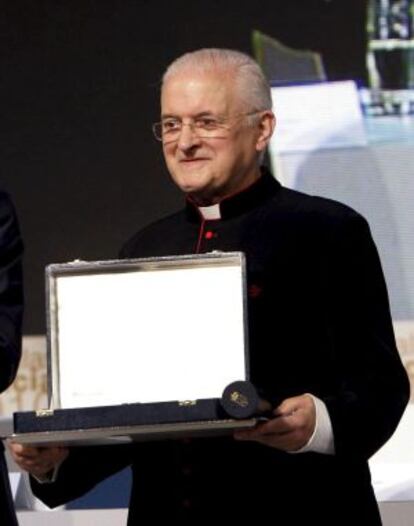Santiago dean in stolen codex case quits cathedral role
Resignation comes ahead of trial against handyman who confessed to theft


The dean of Santiago de Compostela cathedral, José María Díaz, has resigned from his post, citing “personal reasons.” In a statement released on Wednesday morning, Santiago archbishop Julián Barrio said he would accept the resignation and “begin the process of choosing a new dean.” He also denied suggestions that Díaz had been pressured into stepping down by the Episcopal Conference or its head, the Cardinal of Madrid, Antonio María Rouco Varela.
Díaz had been dean of the cathedral since 2006, with his mandate renewed in 2010. But in October 2011 he resigned from his position as canon archivist, which he had held for 36 years, following the theft of a priceless codex from the cathedral.
At the time, Díaz — who needed hospital treatment after hearing the news of the theft — had also wanted to hand in his resignation as dean, but the archbishop rejected that request.
Díaz’s resignation comes ahead of the start of the trial against José Manuel Fernández Castiñeiras, the handyman who is accused of having stolen the codex.
Asked about his resignation by news agency Efe, Díaz said he preferred “not to speak about the subject,” and that he felt “calm and at peace.”
Investigators into the theft have said there was a long-standing relationship between the dean and the former electrician, but that after a number of disagreements, Castiñeiras had decided to steal the codex in an act of “vengeance” against Díaz.
During his last statement before the judge, the self-confessed thief claimed Díaz had ordered him to carry out the robbery in order to increase the international fame of the tomb of the apostle Saint James the Greater. The court has always denied any truth behind this theory.
Tu suscripción se está usando en otro dispositivo
¿Quieres añadir otro usuario a tu suscripción?
Si continúas leyendo en este dispositivo, no se podrá leer en el otro.
FlechaTu suscripción se está usando en otro dispositivo y solo puedes acceder a EL PAÍS desde un dispositivo a la vez.
Si quieres compartir tu cuenta, cambia tu suscripción a la modalidad Premium, así podrás añadir otro usuario. Cada uno accederá con su propia cuenta de email, lo que os permitirá personalizar vuestra experiencia en EL PAÍS.
¿Tienes una suscripción de empresa? Accede aquí para contratar más cuentas.
En el caso de no saber quién está usando tu cuenta, te recomendamos cambiar tu contraseña aquí.
Si decides continuar compartiendo tu cuenta, este mensaje se mostrará en tu dispositivo y en el de la otra persona que está usando tu cuenta de forma indefinida, afectando a tu experiencia de lectura. Puedes consultar aquí los términos y condiciones de la suscripción digital.








































